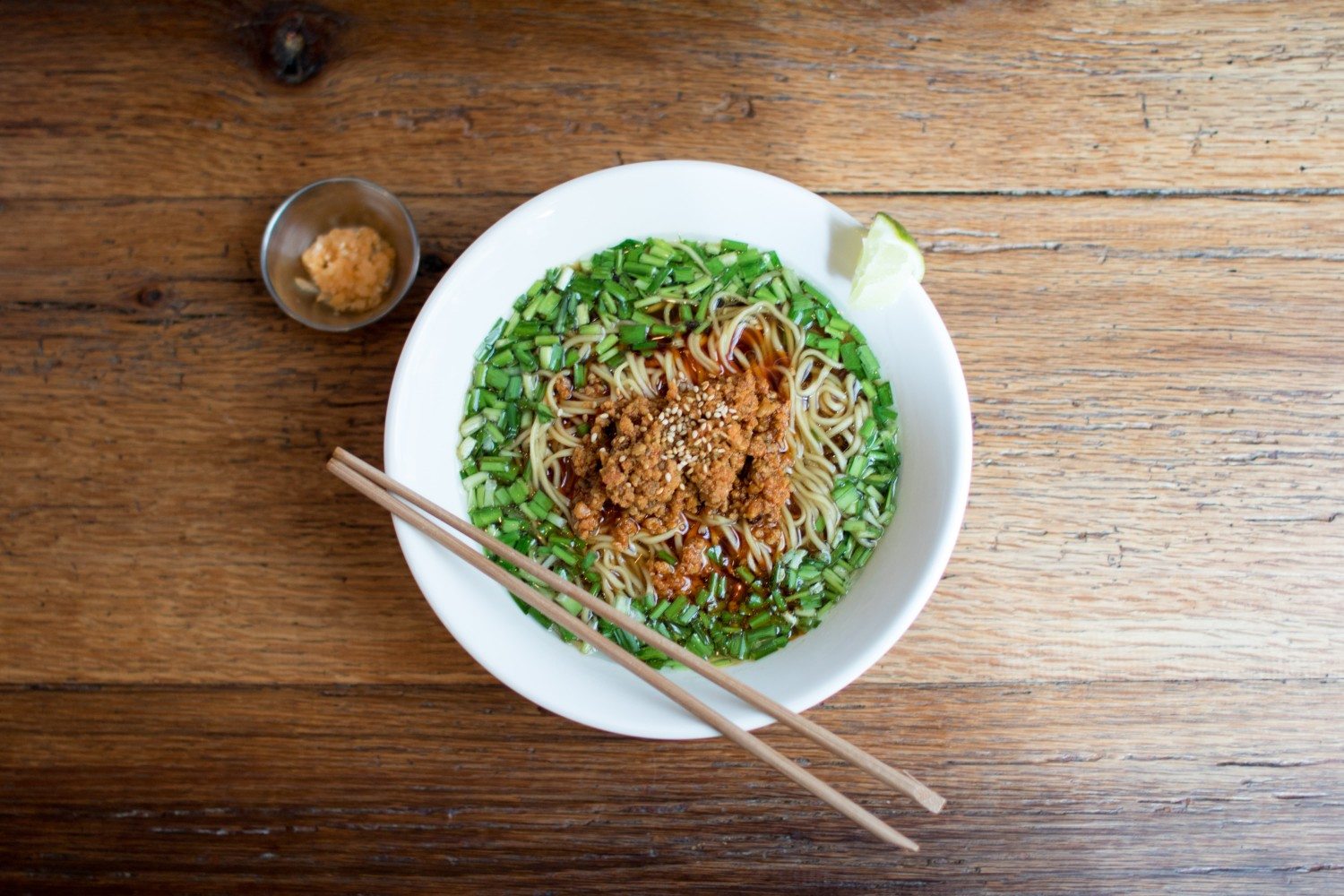Warning: Undefined array key "sharing_networks_networks_sorting" in /var/www/wp-content/plugins/monarch/monarch.php on line 3904
Warning: Trying to access array offset on value of type null in /var/www/wp-content/plugins/monarch/monarch.php on line 3904
As the weather gets colder this time of year in Manhattan, New Yorkers tend to crave warmer food. One of the most popular items within the “comfort food” spectrum is Japanese-style ramen, and the recently-opened MEW MEN is a local spot on Cornelia Street worth checking out. Carrying a music theme throughout the restaurant, diners may not only notice the DJ sound system that lines its back wall, but the sheet music stand holding the menu at the entrance, the stage light fixtures adorning the ceiling, and the deconstructed music cases repurposed as legs for the dining room’s tables.
MEW MEN was opened by Kei Oku, who not surprisingly has a background in the music industry, having worked as a recording engineer and an artist manager. He moved to New York in 2010, first working as a server at Kodama Sushi, learning the business from the ground up. Kei joined the Hand Hospitality Group in 2013, opening and managing the company’s first ramen concept, Izakaya MEW. Three years following that, Kei now oversees Izakaya MEW and MEW MEN for Hand Hospitality.
Kei spoke to Downtown about MEW MEN and plenty more. The ramen spot can be visited online at www.mewmennyc.com.
Prior to opening MEW MEN, you worked in the music industry. Is there an accomplishment from your work in the music world that you are most proud of?
Kei Oku: #1: Working as an artist manager is a very challenging job especially in the Asian culture. But I’m proud of the experience because it gave me the patience and understanding needed to work in the hospitality industry. #2: The musicians I represented were quite famous so I had the fortunate opportunity to work with some of the top leaders of the Japanese music industry.
What specifically inspired you to change from a career in the music industry to the hospitality world?
KO: The main reason was that I wanted to move to New York. A friend introduced me to my boss, who also used to work as an artist manager. Because of our similar backgrounds, we gained a mutual respect for one another and he became a great mentor. The reason why I am now working in New York and in the restaurant industry is because of him.
Was it an easy transition for you to move to New York City from Japan?
KO: No, it was quite challenging. I hadn’t actually even spoken or met my first New York City boss until I landed at JFK [Airport]. My boss picked me up at the airport and that’s how everything started for me in the U.S.
Are there any similarities between what you do now and what you used to do within music?
KO: Both chefs and musicians can be considered artists. Communication is also key for both industries.
How would you describe MEW MEN to someone who hasn’t yet been there?
KO: MEW MEN brings a new dining experience to New York City that celebrates the balance between music and ramen. The formula to perfect ramen is not just within the broth, seasoning and aromatic oil, but within the balance of the melody, harmony and rhythm of the music played while the ramen is cooked and eaten. We offer this harmonious balance at the restaurant and only use the freshest ingredients to make the best ramen in New York!
Do you have a favorite item on the menu there?
KO: Iburigakko Cheese. When I visited Qmen for the first time — our ramen consultant’s place in Sapporo, Japan — I had it and it became my favorite dish which is why I wanted to add it to the MEW MEN menu.
Does your ramen recipe come from anyone in particular? Someone in your family?
KO: We invited an expert ramen chef from Japan to consult for MEW MEN and help create our recipes. Culinary Director Hiroshi Hiraoka comes to MEW MEN with vast experience in Japanese cuisine, having worked at Ippudo in Japan for 12 years, and opened his own ramen shop in Sapporo City called Q-Ramen. Unlike the traditional tonkotsku — pork bone broth — ramen-style that Hiraoka had mastered in Japan, Miraoka’s take on MEW MEN features a chicken broth, made from fresh, locally-sourced chickens, in-house every day.
Who else is on the MEW MEN team?
KO: We most recently launched a lunch menu that represents the teisyoku-style Japanese lunch meal. Chef Akira is in charge of this lunch. He has knowledge of kappo-style Japanese food, which uses very traditional and authentic techniques. For lunch we serve delicious tempura, grilled cod fish, tonkatsu and more.
How do you like to spend your free time?
KO: I love to live and work in Manhattan, but spend time driving to the countryside when I want to get away from the noise of the city.
Do you have tickets to any upcoming concerts in New York?
KO: Not right now, but I’m always looking for a good concert to attend.
Aside from MEW MEN, what is your favorite restaurant in New York?
KO: Estela does an amazing job and I really enjoy their menu. But if I were to choose a Japanese restaurant, it would be Izakaya in the East Village. They also have a very good menu and change their dishes depending on what ingredients are in-season.






